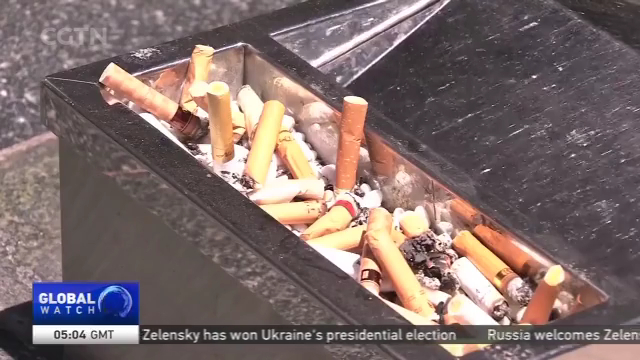
14:00, 22-Apr-2019
Earth Day: Ban the Butt Campaign: Environmentalists focus on No.1 man-made contaminant
Updated
13:50, 25-Apr-2019
03:43

More than five trillion cigarettes are made each year, and experts say the butts of two-thirds of them are discarded irresponsibly. In fact, these small but omnipresent stubs have become the No.1 man-made contaminant in the world's oceans, and there are fears their chemicals might one day penetrate the global food chain. CGTN's Phil Lavelle reports from San Diego.
Look at the state of that water. You wouldn't want to go swimming in it.
PHIL LAVELLESAN DIEGO "But head to the beach in California, there's every chance you could be."
These fish are! And within seconds of being dropped into it, they're in a bad way.
THOMAS NOVOTNY PUBLIC HEALTH EXPERT & ANTI-SMOKING CAMPAIGNER "The lab folks have put eight butts in two liters of water and circulated it for 24 hours."
This stuff is called leachate. It's water, polluted with chemicals from discarded cigarettes. The fish vomiting, struggling to breathe.
THOMAS NOVOTNY PUBLIC HEALTH EXPERT & ANTI-SMOKING CAMPAIGNER "It tells us potentially what we can experience as chemical toxicity."
And the fear is that we are being exposed to those chemicals on a grand scale here in the world's waters.
Because while plastic pollution's a big problem. Discarded cigarette butts appear to be an even bigger one.
THOMAS NOVOTNY PUBLIC HEALTH EXPERT & ANTI-SMOKING CAMPAIGNER "It's a chronic, long-term pollutant in the environment."
Officially recognized as the most commonly littered item in the US - indeed, the world. The most picked-up item on beaches for the last 30 years. And many more being washed out to sea.
PHIL: "When you look at a cigarette, most people are going to think: the filter, it's made of paper, throw it away, it's fine. Why is there an issue here?"
THOMAS NOVOTNY PUBLIC HEALTH EXPERT & ANTI-SMOKING CAMPAIGNER "Well, it's not paper. It's plastic. It has a paper coating and that deteriorates in the environment, but the plastic acetate filter doesn't. It stays years."
PHIL LAVELLE SAN DIEGO "The challenge here is how do you stop cigarette butts from ending up on the beach in the first place? The obvious answer is to ban smoking, make it illegal on every beach. But then you've got the problem of how to police miles and miles of coastline. On top of that, there's another issue and that is that many cigarette butts do not start life on the beach, they come from residential areas, and when it rains, the storm drains take the trash - including those butts - and wash it out into the ocean."
DR EUNHA HOH PUBLIC HEALTH SCIENTIST, SAN DIEGO STATE UNIVERSITY "Nicotine was also found in the fish tissues."
That means the butts - and their contents.
DR EUNHA HOH PUBLIC HEALTH SCIENTIST, SAN DIEGO STATE UNIVERSITY "Some of the chemicals are actually quite persistent."
Which is what this lab's been investigating and leading to the obvious question.
Phil: "Presumably, the chemicals go into the fish, We eat them, what happens to us?"
DR EUNHA HOHPUBLIC HEALTH SCIENTIST, SAN DIEGO STATE UNIVERSITY "We don't actually know what happens to us. That's another question. Humans are exposed to so many chemicals. But we never thought about cigarette disposal coming back to us. We may take up those chemicals."
For those who hate the thought of it - like these students.
STUDENT "We've picked up about 47 cigarette butts on our five meter by one hundred meter stretch."
And the surfers.
"It disgusts me that much, that almost every day I'll go down to the beach and pick stuff up."
it is a problem they'll likely never beat. But for this campaigner, there is one radical suggestion: ban filters altogether.
THOMAS NOVOTNY PUBLIC HEALTH EXPERT & ANTI-SMOKING CAMPAIGNER "If we can get filters out of the environment, it's very likely that will improve the environment but also discourage people from smoking. it will make it less comfortable to smoke, it will help demystify this notion of the filter being a health benefit."
A toxic habit - not just for smokers, but nature too. Phil Lavelle, CGTN, San Diego.

SITEMAP
Copyright © 2018 CGTN. Beijing ICP prepared NO.16065310-3
Copyright © 2018 CGTN. Beijing ICP prepared NO.16065310-3